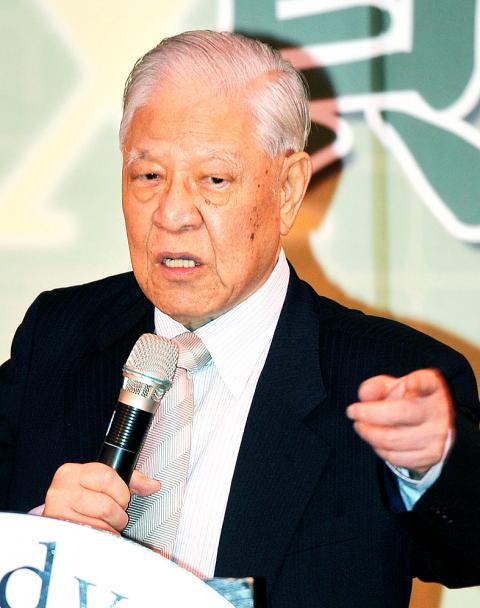The trial of former president Lee Teng-hui (李登輝) on charges of embezzling state funds is scheduled to begin on Oct. 21, the Taipei District Court announced yesterday.
Judge Hu Tsung-kan (胡宗淦) will preside over the case, the district court said.
The Supreme Prosecutors’ Office Special Investigation Division (SID) announced that Yang Jung-tsung (楊榮宗) and Cheng Shen-yuan (鄭深元) are set to be the prosecutors.

Photo: Fang Pin-chao, Taipei Times
As the indictments pertain to national security matters, the hearing is to be held behind closed doors, the court said, adding that security measures were already in place for Lee’s hearing.
The SID accuses Lee and Liu Tai-ying (劉泰英), an aide, of illegally siphoning US$7.8 million from secret diplomatic funds used by the National Security Bureau and laundering the money during his terms in office from 1988 to 2000.
The SID said Lee used those funds to set up the Taiwan Research Institute, which later made him honorary chairman.
The think tank used some of the funds — allegedly laundered by Ruentex Group (潤泰集團) — to purchase luxury offices in downtown Taipei for Lee and Liu, which were also built by the conglomerate, prosecutors said.
They also allege that Liu pocketed US$440,000.
If convicted, the 88-year-old former president could face at least 10 years in prison.
Lee has denied any involvement in corruption.

NATIONAL SECURITY THREAT: An official said that Guan Guan’s comments had gone beyond the threshold of free speech, as she advocated for the destruction of the ROC China-born media influencer Guan Guan’s (關關) residency permit has been revoked for repeatedly posting pro-China content that threatens national security, the National Immigration Agency said yesterday. Guan Guan has said many controversial things in her videos posted to Douyin (抖音), including “the red flag will soon be painted all over Taiwan” and “Taiwan is an inseparable part of China,” while expressing hope for expedited “reunification.” The agency received multiple reports alleging that Guan Guan had advocated for armed reunification last year. After investigating, the agency last month issued a notice requiring her to appear and account for her actions. Guan Guan appeared as required,

Japan and the Philippines yesterday signed a defense pact that would allow the tax-free provision of ammunition, fuel, food and other necessities when their forces stage joint training to boost deterrence against China’s growing aggression in the region and to bolster their preparation for natural disasters. Japan has faced increasing political, trade and security tensions with China, which was angered by Japanese Prime Minister Sanae Takaichi’s remark that a Chinese attack on Taiwan would be a survival-threatening situation for Japan, triggering a military response. Japan and the Philippines have also had separate territorial conflicts with Beijing in the East and South China

A strong cold air mass is expected to arrive tonight, bringing a change in weather and a drop in temperature, the Central Weather Administration (CWA) said. The coldest time would be early on Thursday morning, with temperatures in some areas dipping as low as 8°C, it said. Daytime highs yesterday were 22°C to 24°C in northern and eastern Taiwan, and about 25°C to 28°C in the central and southern regions, it said. However, nighttime lows would dip to about 15°C to 16°C in central and northern Taiwan as well as the northeast, and 17°C to 19°C elsewhere, it said. Tropical Storm Nokaen, currently

PAPERS, PLEASE: The gang exploited the high value of the passports, selling them at inflated prices to Chinese buyers, who would treat them as ‘invisibility cloaks’ The Yilan District Court has handed four members of a syndicate prison terms ranging from one year and two months to two years and two months for their involvement in a scheme to purchase Taiwanese passports and resell them abroad at a massive markup. A Chinese human smuggling syndicate purchased Taiwanese passports through local criminal networks, exploiting the passports’ visa-free travel privileges to turn a profit of more than 20 times the original price, the court said. Such criminal organizations enable people to impersonate Taiwanese when entering and exiting Taiwan and other countries, undermining social order and the credibility of the nation’s